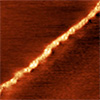| Aug 24, 2023 |
|
(Nanowerk News) Using DNA technologies to create a new generation of tiny electronics components at low production costs: this is the main goal of the European-funded project 3D-BRICKS, coordinated by Istituto Italiano di Tecnologia (IIT-Italian Institute of Technology) in Genoa (Italy), and involving an interdisciplinary team of top researchers from Italy, Spain, Germany, Belgium, and Switzerland.
|
|
The project, which has been founded by the European Union under the Horizon EU framework program with 3.7 million euro for the next 3 years, is coordinated by Denis Garoli and Remo Proietti Zaccaria, researchers at the IIT in Genoa.
|
|
The current semiconductors and nanoelectronics technologies are based on metal–oxide–semiconductor devices, whose performance is close to its end. Alternative technologies, which might be able to perform better in terms of computing power and energy efficiency, have not yet been identified.
|
|
Researchers of the 3D-BRICKS project want to focus on the use of carbon nanotubes – the most promising candidates because of their nano dimensions – together with DNA technologies, to obtain nano-transistors with unprecedented size, performances, and low production costs.
|
|
The current fabrication technique of high-performance carbon nanotube-based transistors is extremely challenging. The 3D-BRICKS project will introduce a biological approach, in the sense that researchers want to deploy the ability of DNA to naturally create 2D and 3D geometries, by using 3D DNA-nanostructures as template for transistors, digital logics and memory.
|
|
Carbon nanotubes will be used as a “brick” able to arrange in a self-assembling materials, such as metals and semiconductors, at nanometer dimension.
|
|
The use of nanomaterials anchored along the DNA carrier enables to reduce significantly the complexity and the time cost of the fabrication, with a spatial resolution close to the diameter of double strand DNA (ca. 2 nanometers). Once a single layer of material is realized, the 3D-BRICKS project will then lift the biofabrication of 3D-Carbon Nanotubes transistors on a new level by playing with the third dimension, where multiple layers of electronic logics integrated in the same structure.
|
|
This novel approach will allow to realize nano transistors in a more compact and efficient way, paving the way for science tech industries of the future.
|
|
In addition to IIT, the 3D-BRICKS consortium is composed by: University of Fribourg (Switzerland), Universitaet Leipzig (Germany), Universitaet Hamburg (Germany), Universiteit Antwerpen (Belgium), Karlsruher Institut Fuer Technologie (Germany), KERR S.R.L. (Italy), Fundacio Institut Catala De Nanociencia y Nanotecnologia (Spain), CNT Innovation (Belgium).
|

